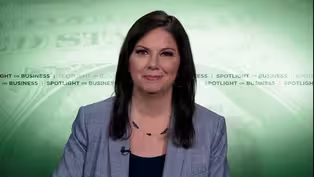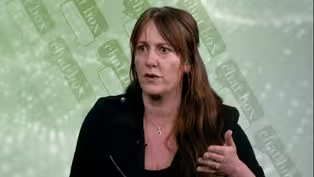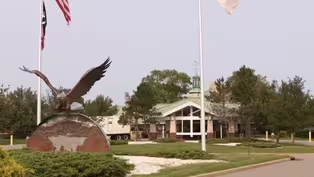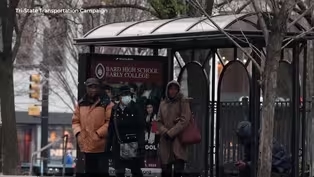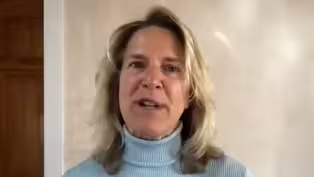NJ Spotlight News
Maya van Rossum full interview
Clip: 2/17/2023 | 8m 22sVideo has Closed Captions
Full interview with Delaware Riverkeeper Maya van Rossum
Maya van Rossum, the Delaware Riverkeeper, says a lot of progress has been made in the Delaware River's clean up but more work remains.
Problems playing video? | Closed Captioning Feedback
Problems playing video? | Closed Captioning Feedback
NJ Spotlight News is a local public television program presented by THIRTEEN PBS
NJ Spotlight News
Maya van Rossum full interview
Clip: 2/17/2023 | 8m 22sVideo has Closed Captions
Maya van Rossum, the Delaware Riverkeeper, says a lot of progress has been made in the Delaware River's clean up but more work remains.
Problems playing video? | Closed Captioning Feedback
How to Watch NJ Spotlight News
NJ Spotlight News is available to stream on pbs.org and the free PBS App, available on iPhone, Apple TV, Android TV, Android smartphones, Amazon Fire TV, Amazon Fire Tablet, Roku, Samsung Smart TV, and Vizio.
Providing Support for PBS.org
Learn Moreabout PBS online sponsorshipMaya when we think about improvements to the Delaware River and specifically to the lower Delaware, where have we seen the biggest strides and what would you say are the biggest challenges that remain?
Well I think most people have heard the story of the Delaware River and how in the 40s, 50s and 60s it was so polluted we had a 20-mile oxygen Dead Zone in the Philadelphia-Camden reach of the river, top to bottom, bank to bank.
You could smell the river from a plane and when ships came up their engines would be clogged because of the amount of contamination or pollution in the river and a lot of that those problems were due to nutrient pollution really um from sewage treatment plants and so through environmental activism and laws at the state level, the federal level and through the regional Delaware River Basin Commission, we made a lot of progress and cleaned up a lot of that pollution put in place needed technologies to help keep those the sewage pollution and nutrient pollution out of the river.
And so we don't have an oxygen Dead Zone anymore but we have an oxygen SAG.
We don't have dock workers coming to the docks and getting sick and even dying from contamination on the river and yet there are still concerns about people literally you know swimming in the water and recreating in a way that that they get submerged in the water.
So that's an area where we've had dramatic progress but there's still a lot of work to do.
I think um when we just look overall at what needs to happen for the Delaware River we really need our state, federal and regional Delaware River Basin Commission to be much more proactive in not just trying to clean up the harm from the past, but saying "no" to new threats to our Delaware River.
Like toxic fracking wastewater, liquefied natural gas export facilities, dredging and deepening projects, damaging development projects.
If we can start saying no to things that will inflict harm we will avoid contamination and devastation that will cost us down the line.
When you think about those threats Maya, are there species that are native to this part of the river in particular that are at heightened danger?
There are a lot of species that really are suffering because of pollution, contamination, inappropriate dredging and development projects.
And one of the most iconic, that I have literally for my entire 30-year career as the Delaware Riverkeeper been working to save, is the Delaware River's genetically unique population of Atlantic sturgeon.
This is a population of Atlantic sturgeon that only exists in our beautiful Delaware River and because of all of these harms to the river, again pollution, dredging devastation to their to their habitat and the the lack of oxygen necessary at the levels to support the procreation the propagation and the thriving of the species.
At this point we have less than 250 spawning adults left, that's all.
Now I didn't mention you know part of the problem was historically we had over harvesting of the sturgeon, but that stopped decades ago and so there's they should have been allowed to come back but because of all of these other inappropriate actions and activities allowed by government action or a failure of government action to be proactive about things like um restoring the oxygen levels necessary to properly support the sturgeon, we have so few sturgeon left.
That this is actually the species of Atlantic sturgeon and amongst many many species literally worldwide that are considered to be most at peril from extinction.
So when you see and hear of um you know the river being touted as a success story, which largely it is, um where does your mind go in terms of just how much more we need to do to truly clean it up and to truly mitigate?
I mean you mentioned development, fracking, despite bans the waste can still make its way in.
Um what would you see as next steps?
Well so you know we're sort of at this tipping point We've made a lot of progress um there's more to be done but there are new threats coming down the pipe.
So yes we kept fracking out of our watershed through a lot of hard work and activism and yet right now there is a proposal to allow toxic fracking wastewater to come into our watershed in ways that would allow it to get into the environment and potentially into our waterways.
There are new development projects, industrial projects that are being proposed all the time.
So I mean I think what we really need is we need our government officials to be proactive about cleanup but also again about preventing future harm and using their authority um to be mindful of how we can stop the harms before they start.
And I guess the myriad of options are just too great, really depends on where you are in the watershed.
What that threat is.
Whether we're talking about in the upper reaches, development of things like warehousing or in the lower reaches when we're talking about a lack of oxygen due to all kinds of pollution inputs that are still going into the river.
You know I think a lot of folks maybe take for granted where it's at now if they haven't been around to see just what it was like decades ago and all that had to be done.
What do you think isn't talked about when it comes to the watershed and how far it's come?
What's not been a part of the conversation that you think needs to be?
So that folks keep in mind just how vital a resource it is.
I mean I think truly there's a lot of great conversation about the Delaware River but it really depends on where you're at, on what your you know what you are most aware of or not.
I think the the story of the Atlantic sturgeon, such an iconic species that's been around since the time of the dinosaurs but may not survive the time of people.
Most people aren't aware of that particular story but when they hear it they become alarmed and they want to know, what is the cause?
What is the problem?
How can we restore the sturgeon?
And then we have to have this complicated conversation about all these different pathways of harm and therefore multiple pathways for solutions.
So I think it really is more um it's not that that we're not having those conversations but we're not having them broadly enough.
Um and I think that also we are not recognizing that the Delaware River is an intimate part of many people's lives and for low-income communities, communities of color, it is a source of recreation, it is a source of food for them.
Um it is the place that they can go and enjoy nature and get extra food for their plate through um fishing for you know multiple species in the river.
And yet engaging in some of those activities because of ongoing pollution can be a real threat to those communities.
And so I think another you know part of the conversation we need to be bringing to the forefront is being more mindful about how important environmental true environmental justice is for our river, for our region and for our communities and that we stop disproportionately impacting communities of color and low-income communities through our current system of laws, which frankly embrace environmental racism, don't actually do enough to prevent it.
Maya van Rossum, Delaware Riverkeeper, thank you so much as always for your insight on this.
Thanks for having me, I appreciate the opportunity.
[Music]
Business Report: Curbing water service shut-offs
Video has Closed Captions
Clip: 2/17/2023 | 2m 21s | Proposal to prohibit certain water companies from shutting off service (2m 21s)
DeGise 'wanted to throw up' after seeing hit-and-run video
Video has Closed Captions
Clip: 2/17/2023 | 4m 52s | Jersey City councilwoman was fined $5,000 and lost her license for a year (4m 52s)
Menlo Park veterans home facing more than $320k in fines
Video has Closed Captions
Clip: 2/17/2023 | 1m 4s | The fines stem from violations found by federal investigators last summer (1m 4s)
Murphy makes stop in Ukraine on way to Munich conference
Video has Closed Captions
Clip: 2/17/2023 | 1m 5s | Murphy is the first U.S. governor to visit Ukraine since the war began (1m 5s)
NJ Transit users in push for Bus Riders’ Bill of Rights
Video has Closed Captions
Clip: 2/17/2023 | 4m 32s | Advocates say bus service is a necessity, not a convenience (4m 32s)
Outpouring of anger, tears over bullying at high school
Video has Closed Captions
Clip: 2/17/2023 | 5m 29s | School board accused of falling short over allegations at Central Regional HS, Bayville (5m 29s)
Water's Edge: More work needed for Delaware River cleanup
Video has Closed Captions
Clip: 2/17/2023 | 4m 15s | Maya van Rossum of Delaware Riverkeeper Network discusses persistent and emerging threats (4m 15s)
Providing Support for PBS.org
Learn Moreabout PBS online sponsorship
- News and Public Affairs

Top journalists deliver compelling original analysis of the hour's headlines.

- News and Public Affairs

FRONTLINE is investigative journalism that questions, explains and changes our world.












Support for PBS provided by:
NJ Spotlight News is a local public television program presented by THIRTEEN PBS
